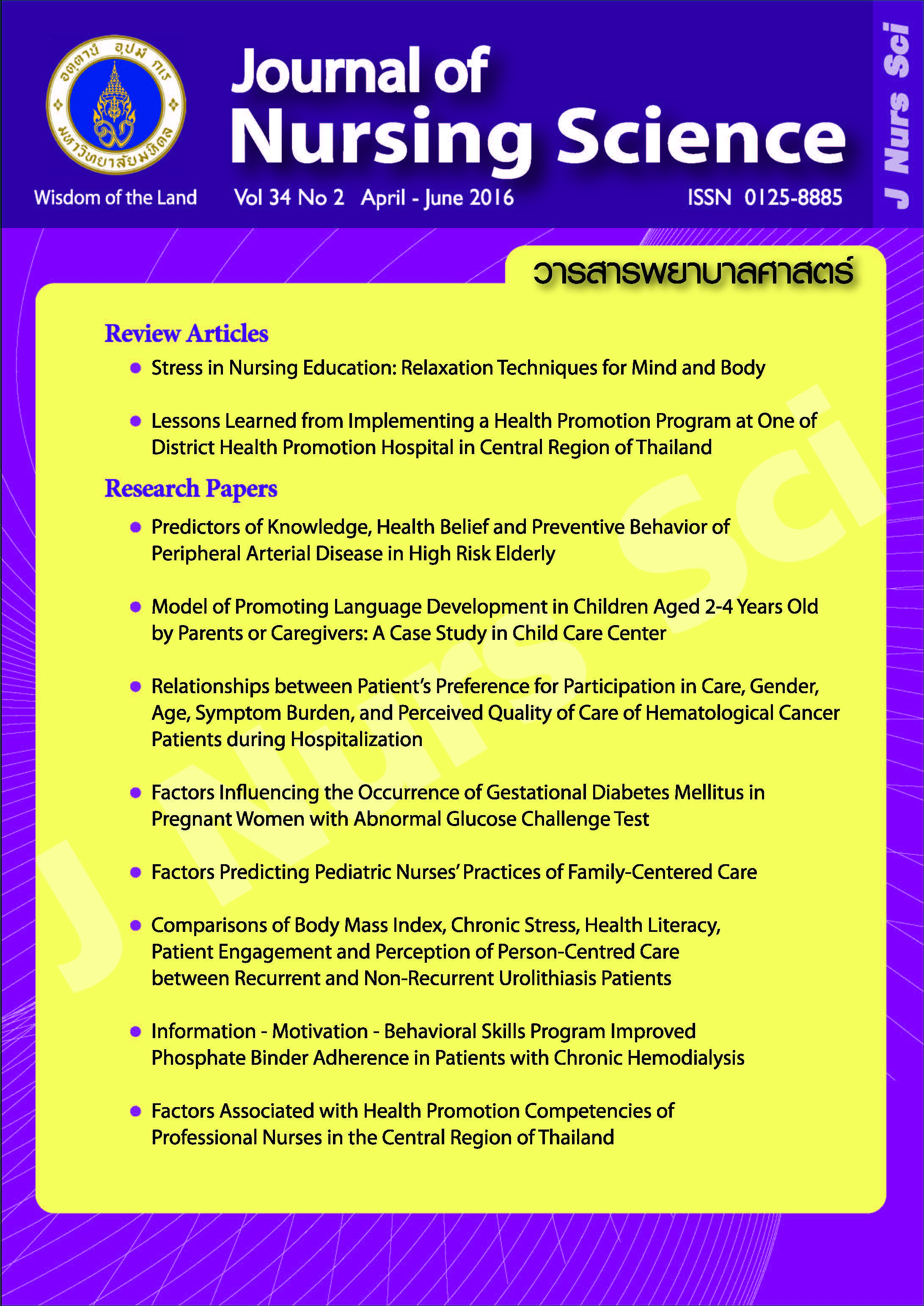Predictors of Knowledge, Health Belief and Preventive Behavior of Peripheral Arterial Disease in High Risk Elderly
Main Article Content
Abstract
Abstract
Purpose: To determine the predictive power of knowledge, health belief and preventive behavior of peripheral arterial disease in high risk elderly.
Design: A correlational predictive design.
Methods: The purposive sample of 110 high risk peripheral arterial disease elderly who had hypertension, diabetes mellitus, dyslipidemia and obesity in Phuttamonthon, Nakhon Pathom. Collecting data by questionnaire of knowledge, health Belief and preventive behavior of peripheral arterial disease. Data were analyzed by stepwise multiple regression analysis.
Main findings: Knowledge of peripheral arterial disease in high risk elderly, perceived susceptibility, perceived benefit of taking action, perceived barrier of taking action and perceived severity could jointly predicted preventive behavior of peripheral arterial disease 15.7 (R2 = .157, p < .01) Knowledge and perceived barrier of taking action were factors that could significantly predict preventive behavior of peripheral arterial disease in high risk elderly .618 and .267 (β = .618, .267, p < .05)
Conclusion and recommendations: To promote perceived barriers in health belief for preventive behavior of peripheral arterial disease, Nurse should be providing proactive services to the elderly vulnerable groups and developing instructional materials up to date and easy to understand by the elderly.
Keywords: health belief, preventive behavior, peripheral arterial disease, high risk elderly
ปัจจัยทำนายความรู้เรื่องโรคและความเชื่อด้านสุขภาพต่อพฤติกรรมป้องกันการเกิดโรคหลอดเลือดแดงส่วนปลายอุดตันในผู้สูงอายุกลุ่มเสี่ยง
บทคัดย่อ
วัตถุประสงค์: ศึกษาอำนาจการทำนายระหว่างความรู้เรื่องโรคและความเชื่อด้านสุขภาพต่อพฤติกรรมป้องกันการเกิดโรคหลอดเลือดแดงส่วนปลายอุดตันของผู้สูงอายุกลุ่มเสี่ยง
รูปแบบการวิจัย: การศึกษาความสัมพันธ์เชิงทำนาย
วิธีดำเนินการวิจัย : กลุ่มตัวอย่างเป็นกลุ่มผู้สูงอายุกลุ่มเสี่ยงต่อการเกิดโรคหลอดเลือดแดงส่วนปลายอุดตันใน อำเภอพุทธมณฑล จังหวัดนครปฐม ที่คัดเลือกแบบเฉพาะเจาะจง 110 คน เก็บข้อมูลด้วยแบบสอบถามภาวะสุขภาพ ความรู้เรื่องโรคความเชื่อด้านสุขภาพและพฤติกรรมป้องกันการเกิดโรคหลอดเลือดแดงส่วนปลายอุดตันวิเคราะห์ข้อมูลโดยการวิเคราะห์ถดถอยพหุคูณแบบป้อนเข้า
ผลการวิจัย: ความรู้เรื่องโรค ความเชื่อสุขภาพด้านการรับรู้โอกาสเสี่ยงต่อการเกิดโรค ด้านการรับรู้ประโยชน์ ด้านการรับรู้เรื่องอุปสรรค และด้านการรับรู้ความรุนแรง สามารถร่วมกันอธิบายความแปรปรวนของพฤติกรรมป้องกันการเกิดโรคหลอดเลือดแดงอุดตันได้ร้อยละ 15.7 (R2 = .157, p < .01) โดยตัวแปรที่สามารถทำนายพฤติกรรมป้องกันการเกิดโรคหลอดเลือดแดงอุดตันได้อย่างมีนัยสำคัญทางสถิติที่ระดับ .05 คือ ความรู้เรื่องโรคหลอดเลือดแดงส่วนปลายอุดตันและความเชื่อสุขภาพด้านการรับรู้อุปสรรคของการปฏิบัติ ซึ่งมีค่าสัมประสิทธิ์การทำนายเท่ากับ .618 และ .267
สรุป และข้อเสนอแนะ: ควรเน้นการให้บริการเชิงรุกแก่ผู้สูงอายุกลุ่มเสี่ยงในชุมชน โดยส่งเสริมให้เกิดความเชื่อสุขภาพด้านการรับรู้อุปสรรคของการปฏิบัติเพื่อป้องกันการเกิดโรคหลอดเลือดแดงส่วนปลายอุดตัน และพัฒนาสื่อสอนให้มีความทันสมัยเหมาะกับผู้สูงอายุ
คำสำคัญ: ความเชื่อด้านสุขภาพ พฤติกรรมป้องกันการเกิดโรค โรคหลอดเลือดแดงส่วนปลายอุดตัน ผู้สูงอายุกลุ่มเสี่ยง
Article Details
Copyright Notice: Nursing Science Journal of Thailand has exclusive rights to publish and distribute the manuscript and all contents therein. Without the journal’s permission, the dissemination of the manuscript in another journal or online, and the reproduction of the manuscript for non-educational purpose are prohibited.

Disclaimer: The opinion expressed and figures provided in this journal, NSJT, are the sole responsibility of the authors. The editorial board bears no responsibility in this regard.

